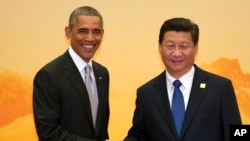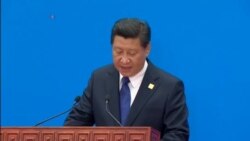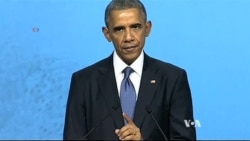ສະຫະລັດ ແລະ ຈີນ ໄດ້ບັນລຸຄວາມກ້າວໜ້າ ໃນການເຈລະ
ຈາເພື່ອຂະຫຍາຍ ຂໍ້ຕົກລົງຂອງອົງການການຄ້າໂລກ ທີ່ຈະ
ລົບລ້າງການເກັບພາສີພະລິດຕະພັນ ເຄື່ອງເທັກໂນໂລຈີທີ່
ກ້າວໜ້າທັນສະໄໝຫລືຮາຍເທັກ.
ການຕົກລົງດັ່ງກ່າວ ໄດ້ປະກາດທີ່ນະຄອນປັກກິ່ງໂດຍປະ
ທານາທິບໍດີ Barack Obama ທີ່ໄດ້ພົບປະໃນວັນອັງຄານ
ມື້ນີ້ ກັບບັນດາຜູ້ນຳສູງສຸດຂອງຈີນ ຫຼັງຈາກກອງປະຊຸມສຸດ
ຍອດເສດຖະກິດປະຈຳຂົງເຂດຫຼືເອເພັກສິ້ນສຸດລົງ.
ປະທານາທິບໍດີ Obama ກ່າວວ່າ ສະຫະລັດແລະຈີນ ໄດ້
“ບັນລຸຄວາມເຂົ້າໃຈກັນ” ທີ່ຈະນຳໄປສູ່່ການເຈລະຈາໃນຂອບເຂດກວ້າງຂວາງ ເພື່ອຂະ
ຫຍາຍ ຂໍ້ຕົກລົງດ້ານຂໍ້ມູນເທັກໂນໂລຈີ ຫລື ITA ຂອງອົງການ ການຄ້າໂລກ.
ການເຈລະຈາໄດ້ຖືກໂຈະຊົ່ວຄາວ ໃນເດືອນພະຈິກ ປີ 2013 ເພາະມີຄວາມແຕກຕ່າງ
ລະຫວ່າງສະຫະລັດ ແລະຈີນ ກ່ຽວກັບ ພະລິດຕະພັນທີ່ສົມຄວນຮວມຢູ່ໃນຂໍ້ຕົກລົງນີ້.
ຖະແຫລງການໂດຍຜູ້ຕາງໜ້າດ້ານການຄ້າສະຫະລັດ ທ່ານ Michael Froman ກ່າວ
ວ່າ ຫລັງຈາກສະຫະລັດ-ຈີນ ໄດ້ບັນລຸການຕົກລົງເພື່ອສ້າງ ຄວາມກ້າວໜ້າແລ້ວ ການ
ເຈລະຈາຢ່າງເຕັມທີີ່ ບັດນີ້ມີກຳນົດຈະເລີ້ມໃນເດືອນທັນວາຈະມານີ້.
ຖະແຫລງການກ່າວວ່າ ເຄຶ່ອງມືການແພດ ເກມຫລີ້ນວີດີໂອ ເຄື່ອງຊອບແວ ຄອມພີວເຕີ
ແລະເຄຶ່ອງເຊມີຄອນດັກເຕີຮຸ້ນໃໝ່ ແມ່ນຮວມຢູ່ໃນບັນຊີຜະລິດຕະພັນຮາຍເທັກ ທີ່ຈະ
ຖືກລົບລ້າງພາສີ.
ຂໍ້ຕົກລົງ ITA ທີ່ໄດ້ເປັນເລີ້ມມີຜົນບັງຄັບໃນປີ 1997 ຕ້ອງການໃຫ້ບັນດາປະ ເທດທີ່ລົງ
ນາມເພື່ອລົບລ້າງການເກັບພາສີ ຕໍ່ຜະລິດຕະພັນຮາຍເທັກຈຳນວນນຶ່ງ. ຫລາຍຄົນກ່າວ
ວ່າ ລາຍຊື່ຂອງ ພະລິດຕະພັນສົມຄວນທີ່ຈະຂະຫຍາຍ ເພາະວ່າຄວາມຄືບໜ້າຕ່າງໆ
ຂອງເທັກໂນໂລຈີ.
ຂໍ້ຕົກລົງການຄ້າເສລີ ແມ່ນເປັນຈຸດເພັ່ງເລັງທີ່ສຳຄັນອັນນຶ່ງ ຂອງກອງປະຊຸມ ສຸດຍອດ
ເສດຖະກິດເອເຊຍ-ປາຊິຟິກ ທີ່ໄດ້ສີ້ນສຸດລົງໃນວັນອັງຄານມື້ນີ້ ທີ່ນະ ຄອນຫລວງ
ປັກກິ່ງ.
The U.S. and China have reached a breakthrough in talks to expand a World Trade Organization agreement that would eliminate tariffs on high-tech products.
The deal was announced in Beijing by President Barack Obama, who meets Tuesday with top Chinese leaders following the conclusion of a regional economic summit.
President Obama said the U.S. and China have "reached an understanding" that will lead to wider talks on expanding the WTO's Information Technology Agreement (ITA).
Negotiations were suspended in November 2013 because of differences between the U.S. and China over what products should be included in the agreement.
A statement by U.S. Trade Representative Michael Froman says that following the U.S.-China breakthrough, full talks are now scheduled to resume in December.
The statement said medical equipment, video game consoles, computer software, and next generation semiconductors are among the high-tech products that will see tariffs eliminated.
The ITA, which went into effect in 1997, requires signatories to eliminate duties on certain IT products. Many say the list of covered products should be expanded because of technological advancements.
Free trade agreements have been a major focus of the Asia-Pacific Economic Summit that wraps up Tuesday in the Chinese capital.
Mr. Obama is using the summit to help push the U.S.-led Trans-Pacific Partnership trade zone. The TPP is controversial because it excludes China and competes with Beijing's own plan for an Asia free trade pact.
President Obama, who says TPP talks are progressing, on Monday hosted regional leaders at the U.S. Embassy in Beijing for talks on the 12-nation trade pact.
At an APEC gathering Tuesday, Chinese President Xi Jinping told regional leaders they should "push vigorously" to advance Beijing's preferred free trade pact, the Free Trade Area of the Asia-Pacific, or FTAAP.
Following the summit, Presidents Obama and Xi meet for dinner Tuesday. On Wednesday, they will hold formal talks as part of a state visit by Mr. Obama.
The visit comes during a time of strained US-Sino relations on issues ranging from cyber espionage to human rights as well as an impression among Chinese leaders that the U.S., through the rebalance of its forces to the Pacific, is trying to contain China.
No major breakthroughs are expected during the talks.
On Monday, the two countries announced a new visa policy that will increase the validity of short-term tourist and business visas issued to one another's citizens from one to ten years - the longest validity allowed under U.S. law - and extend the validity of student and exchange visas from one to five years.







